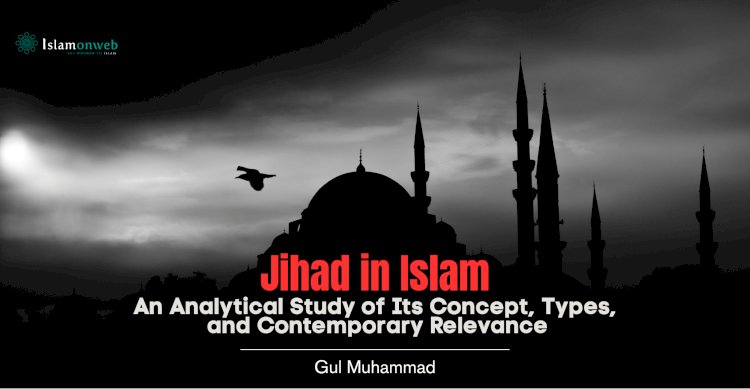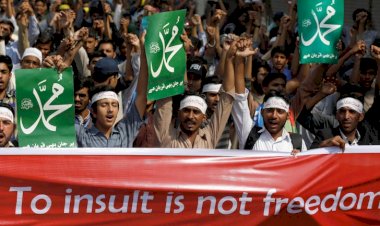Jihad in Islam: An Analytical Study of Its Concept, Types, and Contemporary Relevance
The term Jihad, derived from the Qur’an and the teachings of Prophet Muhammad ﷺ, is recognized by Muslim scholars as an obligatory duty of every believer and is sometimes described as the “sixth pillar of Islam.” Islamic scholarship consistently underscores Jihad as a means of establishing peace, stability, and moral order within society. Conversely, Western societies often conflate Jihad with terrorism, viewing it as a threat to global security. This misconception has been exacerbated in recent decades by violent acts perpetrated by individuals and groups falsely claiming to act in the name of Islam.
This article seeks to clarify the authentic Islamic understanding of Jihad. It first presents an epistemological and typological study of the term, followed by an analysis of the circumstances under which armed Jihad may be declared, the ethical rules governing combat, and its application in modern contexts.
The Concept of Jihad
The meaning of Jihad is often misunderstood as violence and terror, while in reality, it is far more peaceful and constructive. Within Islam, Jihad can be understood, from one perspective, as a struggle to protect Islam and bring positive change in society. From another perspective, Jihad is not merely a call to fight; it is also a set of efforts to grow spiritually and to free oneself and the world from moral and social challenges.
Etymological and Theological Foundations
The word "jihad" etymologically comes from the Arabic verb "jahada," which means to exert oneself, strive, or use effort to achieve a goal is derived from the Arabic word ‘Jahada’.
Jihad in Sharia covers spiritual exertion (striving against one’s lower self, called "jihad al-nafs") and can also refer to military defense of the Muslim community when oppressed or attacked. The Qur'an and hadith emphasize two main dimensions: the greater jihad (spiritual, internal struggle for self-improvement and moral resistance) and the lesser jihad (physical struggle, including self-defense in warfare under specific, ethical conditions). Islamic law sets strict rules: armed jihad is never indiscriminate violence, but is justified only for self-defense, to fight oppression, and must protect civilians and non-combatants. Jihad also includes peaceful means such as spreading good, fighting evil through words and deeds, and defending one's rights and those of the oppressed.
Jihad in the shar’i (Islamic legal) sense has both a general and a specific meaning. The general meaning is to exert all possible effort and sincerity in obedience to Allah. This includes resisting one’s lower self and evil desires, refraining from worldly passions, worshiping Allah, preventing evil deeds, and verbally preaching Islam. The specific meaning refers to a war on the battlefield as a last resort against those who engage in aggression.
Typology of Jihad
Since Jihad is a broad and comprehensive concept, it can be explained through two major categories: the greater Jihad and the lesser Jihad, though it has many types in Islamic sharia including legal Jihad, verbal Jihad, and spiritual Jihad.
The Greater Jihad
- The Greater Jihad
The Greater Jihad refers to the inner moral and spiritual struggle of a believer to overcome base desires and to maintain steadfastness in faith and virtue. It involves the continuous effort to restrain one’s ego from worldly temptations such as pride, vanity, greed, fame, and the pursuit of power. This inward striving encompasses both the avoidance of sinful behavior and the active performance of righteous deeds.
The Prophet Muhammad ﷺ emphasized this dimension of struggle. Fadālah ibn ʿUbayd reported that the Messenger of Allah said:
الْمُجَاهِدُ مَنْ جَاهَدَ نَفْسَه
“The true warrior in Jihad is the one who strives against his own self.”
Similarly, Ibn Rajab narrates that Ibrahim ibn Abi ʿAlqamah, upon returning from a military expedition, addressed his companions:
وِ قَدْ جِئْتُمْ مِنَ الْجِهَادِ الْأَصْغَرِ فَمَا فَعَلْتُمْ فِي الْجِهَادِ الْأَكْبَرِ
They asked, “What is the Greater Jihad?” He replied:
جِهَادُ الْقَلْبِ
“It is the Jihad of the heart.”
This spiritual striving manifests through acts of worship and service, such as performing the prescribed prayers, fasting, giving charity, aiding the poor and oppressed, caring for the disabled, exercising patience in times of anger, and engaging in every form of virtuous conduct. The Greater Jihad thus represents the lifelong internal discipline required to purify the soul and attain nearness to God.
- The Lesser Jihad
The Lesser Jihad, also known as jihad bi’s-saif(“struggle by the sword”) or qitāl fī sabīl Allāh (“armed struggle in the path of God”), refers to the use of military force under specific, divinely sanctioned conditions. This form of Jihad is not an unrestrained call to violence; rather, it is a carefully regulated act of defense undertaken to protect the freedom of religion, safeguard innocent lives, and uphold justice when peaceful means have been exhausted.
Islamic law lays down strict criteria for the declaration and conduct of armed Jihad. It may only be authorized by a legitimate governing authority and is permissible solely for defensive purposes or to repel oppression. It categorically forbids aggression, wanton destruction, or harm to non-combatants. Fighters are required to observe detailed rules of engagement: civilians, women, children, religious figures, and prisoners of war must be treated with dignity and protected from harm. Warfare must never be pursued for personal gain, vengeance, or worldly ambition, and peace is to be accepted whenever a just settlement becomes possible.
Conditions for the Declaration of Armed Jihad
In Islamic jurisprudence, Jihad represents one of the most profound and serious responsibilities entrusted to the Muslim community. It is not merely a call to warfare, but a sacred struggle undertaken to uphold justice, protect human dignity, and preserve the freedom to practice faith. Within the broader meaning of Jihad—which includes spiritual, intellectual, and social efforts—armed Jihad occupies a highly specific and restricted position. Islamic teachings, as derived from the Qur’an and the Hadith, emphasize that armed struggle is not an arbitrary action but a measure of last resort, permitted only under clearly defined and exceptional circumstances.
According to the Qur’an and the authentic traditions of the Prophet Muhammad ﷺ, armed Jihad can only be declared as a last resort under the following conditions:
- When Peaceful Preaching of Islam Is Suppressed
Armed resistance may be sanctioned when Muslims are prevented from peacefully conveying the message of Islam or practicing their faith.
- When Deliberate Atrocities and Oppression Are Committed Against Humanity
Armed Jihad may also be declared when persistent acts of injustice, persecution, and tyranny threaten human life and dignity. Islam allows those who have been wronged to defend themselves and to seek justice, but always within the limits of morality and without transgressing the rights of innocents. The Qur’an grants this permission with the following command:
أُذِنَ لِلَّذِينَ يُقَاتَلُونَ بِأَنَّهُمْ ظُلِمُوا ۚ وَإِنَّ اللَّهَ عَلَىٰ نَصْرِهِمْ لَقَدِيرٌ
“Permission to fight back is granted to those who have been wronged, and Allah is Most Capable of helping them.” (Qur’an 22:39)
Similarly Allah says another verse
وَمَا لَكُمْ لَا تُقَاتِلُونَ فِي سَبِيلِ اللَّهِ وَالْمُسْتَضْعَفِينَ مِنَ الرِّجَالِ وَالنِّسَاءِ وَالْوِلْدَانِ الَّذِينَ يَقُولُونَ رَبَّنَا أَخْرِجْنَا مِنْ هَذِهِ الْقَرْيَةِ الظَّالِمِ أَهْلُهَا وَاجْعَل لَّنَا مِن لَّدُنكَ وَلِيًّا وَاجْعَل لَّنَا مِن لَّدُنكَ نَصِيرًا
“And what is the matter with you that you do not fight in the cause of Allah and for the oppressed men, women, and children who cry out, ‘Our Lord! Deliver us from this land of oppressors! Appoint for us a savior and a helper from Yourself.’ (Qur’an 4:75)
However, the same scripture immediately tempers this permission with the injunction to embrace peace if the aggressors themselves incline toward reconciliation:
وَإِن جَنَحُوا۟ لِلسَّلْمِ فَٱجْنَحْ لَهَا وَتَوَكَّلْ عَلَى ٱللَّهِ
“If they incline to peace, then you must also incline to it and put your trust in Allah.” (Qur’an 8:61)
This dual guidance ensures that armed struggle remains a defensive and ethical action, never a tool of aggression or vengeance.
- To Defend Oneself from Aggressors
Finally, armed Jihad becomes permissible when Muslims face direct and unlawful aggression. Self-defense is a fundamental right recognized by Islamic law, but it is to be exercised with restraint, avoiding harm to non-combatants, property, and the natural environment. The purpose is the preservation of life, honor, and the community, not the pursuit of domination or worldly
Ethical Regulations of Armed Jihad
Military jihad (jihad bil-saif) has been a pivotal but complex institution within Islamic thought, balancing religious duty and ethical constraints. Classical jurists formulated comprehensive legal norms that govern when and how armed jihad may be legitimately undertaken, emphasizing both divine mandate and humanitarian considerations.
Allah said in Quran:
وَقَـٰتِلُوا۟ فِى سَبِيلِ ٱللَّهِ ٱلَّذِينَ يُقَـٰتِلُونَكُمْ وَلَا تَعْتَدُوٓا۟ ۚ إِنَّ ٱللَّهَ لَا يُحِبُّ ٱلْمُعْتَدِينَ
“Fight in the cause of Allah only against those who wage war against you, but do not transgress. Indeed, Allah does not like transgressors.”
The Prophet Muhammad ﷺ said:
“Depart in the name of Allah, upon the religion of the Messenger of Allah. Do not kill an elderly man, a child, or a woman. Do not plunder, but collect your spoils lawfully. Behave righteously, for Allah loves those who act with excellence.”
Captives must be treated with dignity, provided food and shelter, and shown mercy. A prime example is the Battle of Badr, where the Prophet commanded his companions to treat prisoners as they treated themselves. The companions even gave up their mounts and walked on foot so that the captives could ride.
Jihad in the Modern Context
Jihad, classically defined as striving or exerting effort in the path of God, has evolved in meaning and application in the modern era. While traditional Islamic faith upholds jihad as an encompassing duty involving spiritual self-purification, social reform, and under strict rules, armed struggle is confined to defensive conditions governed by legal authority. Contemporary Muslims face the challenge of interpreting and performing jihad ethically amidst modern statehood, international law, and the proliferation of extremist ideologies.
Performing Jihad Today:
- Spiritual and Moral Jihad
The majority of contemporary Islamic scholarship stresses the "greater jihad," which involves personal struggle against one's base desires and striving for moral excellence and social justice. This form of jihad manifests through peaceful efforts such as education, charity, community service, and promoting ethical behavior. It emphasizes self-discipline, patience, and adherence to Islamic principles in everyday life.
- Social and Verbal Jihad
Jihad today also includes advocacy for justice and human rights, intellectual engagement, and peaceful propagation of faith through dialogue and education. Muslims are encouraged to challenge societal wrongs and support the oppressed through lawful and nonviolent means. This aligns with classical legal limits prohibiting aggression and violence except in self-defense.
Conclusion
Jihad in Islam is an obligatory duty upon every Muslim. It is divided into two categories: the greater Jihad, which involves self-purification and devotion to Allah, and the lesser Jihad, which involves armed struggle only as a last resort against oppression and aggression. When war becomes necessary, strict rules of engagement ensure fairness and protection of non-combatants.
Jihad is the very opposite of terrorism. Islam unequivocally denounces every kind of terror attack. Unfortunately, some individuals misuse the name of Jihad to fulfill personal desires, leading to widespread misconceptions about its true meaning.
About the author:
Gul Muhammad is a student of Class 11 at Qurtuba Leaders’ Academy.
REFERENCE
Jihad in Islam Context, Meaning, and Peaceful Struggle
Jihad Holy or Unholy War
The Concept of Jihad in Islam Its True Meaning
The Concept of Jihad In Islam, Ramlan TengkuErwinsyahbana Nurul Hakim
BBC - Religions - Islam_ Jihad
Disclaimer
The views expressed in this article are the author’s own and do not necessarily mirror Islamonweb’s editorial stance.
1 Comments
-

This article clearly articulated the real and actual understanding of Jihad in Islamic jurisprudence and texts . Eradicating all existing doubts misconceptions , the article shed light on the true meaning of Jihad in Islam. Author clearly defended Islamic view of Jihad from western world and extremist , fundamentalist Muslims who use this as a personal gain.
























Leave A Comment